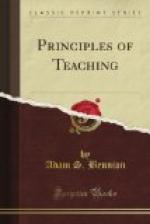II. ORGANIZATION AND EVALUATION OF KNOWLEDGE
We have hinted that a lesson may not have facts enough to justify the time it takes—there is, on the other hand, danger that the whole time of the class may be consumed in a mere rehearsal of facts as facts. Only recently a significant complaint was voiced by a young man who has gone through training in practically all of our organizations. “I don’t seem to know anything at all,” he said, “about the history of Israel, as a whole. I can recall certain isolated facts about particular persons or places, but I can’t give any intelligent answer at all to such questions as these:
“Who were the Israelites? What were their big movements relative to the Promised Land? What is the history of Israel up to the time of the Savior? What is their history subsequently? Are we of Israel and how?”
The young man was not complaining—he merely regretted his ignorance on points of vital interest. He was in need of further organization of the knowledge he had. He had not been given the big central ideas about which to build the minor ones. Relative importance had not been taught him through that organized review that is so valuable in review. The teacher ought to come back time and again to pause on the big essentials—the peaks of gospel teaching.
III. INTERPRETATION AND ELABORATION OF TRUTH
It is really surprising how many various notions of an idea will be carried away by the members of a class from a single declaration on the part of a teacher. A phase of a subject may be presented which links up with a particular experience of one of the pupils. To him there is only one interpretation. To another pupil the phase of the subject presented might make no appeal at all, or linked up with a different experience might lead to an entirely different conclusion. Truths need to be elaborated and interpreted from all possible angles—all possible phases should be developed. An interesting discussion recently took place with a young man who had “gone off” on a pet doctrinal theory. His whole conception built itself up about a single passage of scripture. Satisfied with a single notion, he had shut his eyes to all else and “knew that he was right.” Properly to be taught, he needed to be trained to suspend his judgment until all the evidence was in.
IV. INSPIRATION TO HIGH IDEALS
Men and women like to be carried to the heights. They like to be lifted out of their lower selves into what they may become. It is the teacher’s delight to let his class stand tip-toe on the facts of subject matter to peep into the glories of the gospel plan of life and salvation. In 1903 Sanford Bell, of the University of Colorado, reported the results of a survey conducted with 543 men and 488 women to ascertain whether they liked male or female teachers better and just what it was that made them like those teachers who had meant most in their lives. The survey showed that the following influences stood out in the order named:




